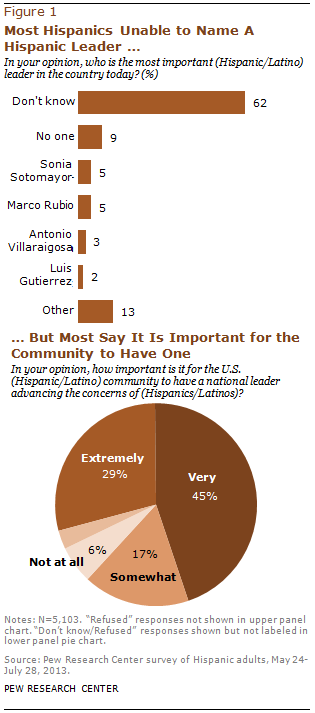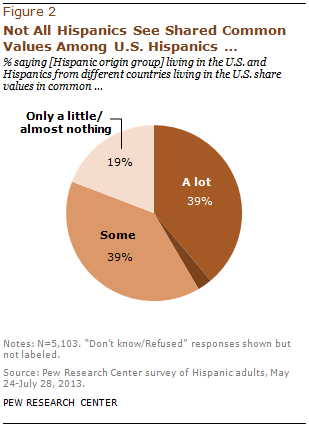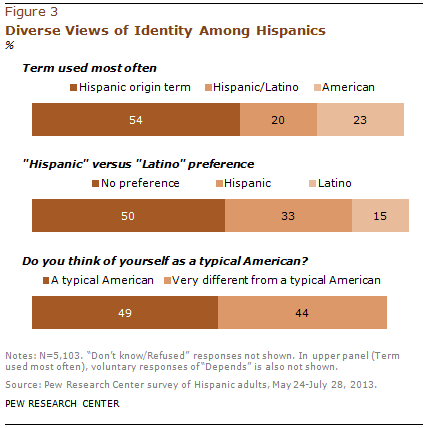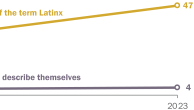
Three-quarters of Latinos living in the U.S. say that their community needs a national leader, but about the same share either cannot name one or don’t believe one exists, according to a new national survey of 5,103 Latino adults conducted by the Pew Research Center from May 24 to July 28, 2013.
When asked in an open-ended question to name the person they consider “the most important Hispanic leader in the country today,” 62% say they don’t know and an additional 9% say “no one.”
In a follow-up question on how important it is for the U.S. Hispanic community to have a national leader advancing its concerns, three-quarters of Hispanic adults say it is “extremely” (29%) or “very” important (45%).
U.S. Supreme Court Justice Sonia Sotomayor and U.S. Sen. Marco Rubio (R-Fla.) were each cited by 5% of survey respondents as the most important Hispanic leader in the country today, followed by former Los Angeles mayor Antonio Villaraigosa at 3% and U.S. Rep. Luis Gutierrez (D-Ill.) at 2%. No one else was mentioned by more than 2% of respondents in the survey.1
The survey was conducted at a time when Latino political leaders and civic organizations have been pressing hard for legislation in Congress to create a pathway to citizenship for the estimated 11.7 million immigrants, the vast majority of them Latino, who are living in this country illegally.

Even though most Latinos say their community needs a national leader to advance its concerns, the survey finds that not all Latinos agree that their community has shared values.
Overall, four-in-ten (39%) respondents say that U.S. Latinos of different origins share “a lot” of values, while another 39% say U.S. Latinos share “some” values and an additional 19% say that they share few or no values. By similar shares, Latinos living in this country are divided about how many values they share with Latinos living in their families’ country of origin.
In another finding that reflects diversity within the Latino community on matters of values and identity, just one-in-five (20%) survey respondents say they most often describe themselves by the pan-ethnic labels “Hispanic” or “Latino.”2
A majority (54%) say they usually use their family’s Hispanic origin term (such as Mexican, Cuban, Salvadoran) to identify themselves, followed by 23% who use “American” most often. The survey also finds that when asked which pan-ethnic term they prefer, “Hispanic” or “Latino,” half (50%) say they have no preference.
The survey finds that half (49%) of all Latinos say they consider themselves a typical American, while 44% say they feel different from the typical American—a share that rises to 67% among immigrants who came to the U.S. in the past five years.

More than 53 million Latinos live in the U.S. today. It is one of the nation’s fastest-growing groups, accounting for more than half of U.S. population growth between 2000 and 2010 (Passel, Cohn and Lopez, 2011). Latinos have also seen the community’s political clout grow, with record turnout in each successive presidential election since 1996 (Lopez and Gonzalez-Barrera, 2013).
The Pew Research Center survey was conducted by landline and cellular telephone, in English and Spanish, from May 24 to July 28, 2013 among a nationally representative sample of 5,103 Hispanic adults. The margin of error for the survey was plus or minus 2.1 percentage points. For details on the survey methodology, see Appendix A.
Among the survey’s other findings:
Naming a National Leader
- Among Hispanics of Cuban origin, some 40% named a leader. By contrast, just 25% of Mexican-origin Hispanics and Salvadoran-origin Hispanics named a leader, the lowest shares among Hispanic origin groups.
- Named leaders are linked to Hispanic origin for some groups. For example, among Cubans, the most named Hispanic leader was Rubio (with 25%). He is of Cuban origin and represents Florida, where 70% of U.S. Cubans reside. Among Puerto Ricans, Justice Sonia Sotomayor was most often named (with 11%). She is of Puerto Rican background and is from the Bronx (25% of Puerto Ricans reside in the New York-northeastern New Jersey metropolitan area).
Need for a National Hispanic Leader
- Foreign-born Hispanics are more likely than native-born Hispanics (82% versus 64%) to say it is “extremely” or “very” important that the nation’s Hispanic community have a national leader advancing its concerns.
- Fully 85% of Spanish-dominant Latinos say it is extremely or very important that the U.S. Latino community have a national leader. Among bilingual Latinos, 74% say the same. However, among English-dominant Latinos, fewer (60%) say this.
- Those who see “a lot” of shared values among Hispanics in the U.S. are the most likely to say a national leader is needed. Fully 82% of this group say it is extremely or very important for the U.S. Hispanic community to have a national leader, compared with 72% among Hispanics who say U.S. Hispanics have only “some” values in common and 69% among those who say Hispanics share “only a little” or no values.
Terms Used Most Often to Describe Identity
- The terms used to describe identity are linked to immigrant generation. Among foreign-born Latinos, two-thirds (66%) say they describe themselves most often by their Hispanic origin term (for example, Mexican, Colombian, Salvadoran). Among second-generation Latinos, 48% say the same, while among Latinos in the third and higher generation, just 20% do this.
- Two-thirds (66%) of Dominican Latinos say they most often use the term “Dominican” to describe themselves. Among Cubans, 63% usually use the term “Cuban” to describe their identity. By contrast, just half of Salvadorans (49%) use “Salvadoran” as their principal identity label.
- Among Latinos with Puerto Rican origin, while 55% say they most often use the term “Puerto Rican” to describe their identity, 28%”—more than any other group—most often use the term “American. (People born in Puerto Rico are U.S. citizens by birth.) Foreign-born Hispanics are nearly twice as likely as native-born Hispanics to usually use their Hispanic origin term to describe themselves—66% versus 36%. When it comes to using the term “American” most often to describe themselves, the pattern reverses: the native born are four times as likely as the foreign born to do so, 42% versus 10%.
Hispanic or Latino?
- Half of Latinos say they have no preference for either the terms “Hispanic” or “Latino.” However, when a preference is expressed, Hispanic (33%) is preferred over Latino (15%) by a margin of 2-1.
- Among Hispanics residing in Texas, just as many say they prefer the term “Hispanic” as say they have no preference for either term—46% versus 44%.
Typical American or Not?
- Some 57% of Puerto Ricans, 55% of Cubans and 53% of Dominicans say they think of themselves as a typical American. (People born in Puerto Rico are U.S. citizens by birth.) By contrast, just one-third of Salvadorans (35%) and other Central Americans (33%) say the same.
- Two-thirds (66%) of native-born Hispanics say they think of themselves as a typical American, while 31% say they think of themselves as very different from a typical American. By contrast, views among the foreign born are reversed. Some 37% say they consider themselves a typical American, and 53% say they consider themselves as very different from a typical American.
- Among immigrant Latinos, the share that say they think of themselves as a typical American rises the longer an immigrant has been in the U.S. Two-in-ten (21%) immigrants who have been in the U.S. for five years or less say they think of themselves as a typical American; among those who have been in the U.S. for 20 years or more, about half (49%) say this.
Shared Values among U.S. Hispanics
- Among Hispanics of Salvadoran origin, half (51%) say Salvadorans living in the U.S. and Hispanics from different countries living in the U.S. share “a lot” of values. By comparison, 38% of Mexicans and 36% of Puerto Ricans say different U.S. Hispanic groups have a lot of values in common.
- Immigrant Latinos are more likely than native-born Latinos to say those of their Latino origin group have a lot of values in common with Latinos from different countries living in the U.S.—43% versus 33%.
Shared Values among Hispanics in the U.S. and those in the Home Countries
- When asked how much values U.S. Hispanics have in common with people living in their country of Hispanic origin, 38% say “a lot,” 34% say “some,” and 25% say “only a little” or “almost nothing.”
- Some 56% of Salvadorans say those in the U.S. share a lot of values with people living in El Salvador. That is the highest share among Hispanic origin groups.
- One-third (36%) of Cubans say those in the U.S. share only a little or almost nothing with people living in Cuba. That is the highest share saying this among Hispanic origin groups.
About this Report
This report focuses on Latinos’ views of national Latino leadership. It also explores Latinos’ views of identity. It is based on findings from a Pew Research Center nationally representative survey of 5,103 Hispanic adults conducted from May 24 through July 28, 2013. The survey was conducted in all 50 states and the District of Columbia among a randomly selected sample of Hispanic adults. The survey was conducted in both English and Spanish on cellular as well as landline telephones. The margin of error for the full sample is plus or minus 2.1 percentage points at the 95% confidence level. Interviews were conducted for the Pew Research Center by Social Science Research Solutions (SSRS).
The report was written by director Mark Hugo Lopez. Paul Taylor provided editorial guidance on the report. Jon Cohen provided comments on an earlier draft of the report. Cary Funk and Scott Keeter provided comments on the report’s methodology section. Funk, Ana Gonzalez-Barrera, Hamar Martínez, Keeter, Luis Lugo and Taylor contributed to the development of the survey instrument. Anna Brown and Eileen Patten provided research assistance and number-checked the report. Marcia Kramer was the copy editor.
A Note on Terminology
The terms “Latino” and “Hispanic” are used interchangeably in this report.
“Native born” or “U.S. born” refers to persons born in the United States and those born in other countries to parents at least one of whom was a U.S. citizen.
“Foreign born” refers to persons born outside of the United States to parents neither of whom was a U.S. citizen. Foreign born also refers to those born in Puerto Rico. Although individuals born in Puerto Rico are U.S. citizens by birth, they are included among the foreign born because they are born into a Spanish-dominant culture and because on many points their attitudes, views and beliefs are much closer to Hispanics born abroad than to Hispanics born in the 50 states or the District of Columbia.
“First generation” refers to foreign-born people. The terms “foreign born,” “first generation” and “immigrant” are used interchangeably in this report.
“Second generation” refers to people born in the United States, with at least one first-generation parent.
“Third and higher generation” refers to people born in the United States, with both parents born in the United States. This report uses the term “third generation” as shorthand for “third and higher generation.”
Language dominance, or primary language, is a composite measure based on self-described assessments of speaking and reading abilities. “Spanish-dominant” persons are more proficient in Spanish than in English, i.e., they speak and read Spanish “very well” or “pretty well” but rate their English-speaking and -reading ability lower. “Bilingual” refers to persons who are proficient in both English and Spanish. “English-dominant” persons are more proficient in English than in Spanish.




